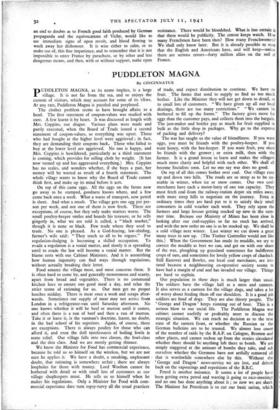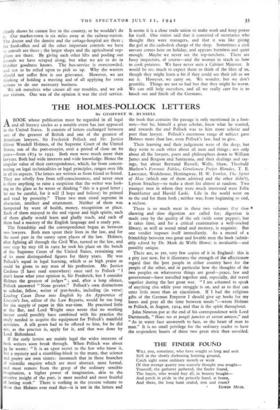PUDDLET ON MAGNA
By CINCINNATUS
pUDDLETON MAGNA, as its name implies, is a large village. It is not far from the sea, and so enjoys the custom of visitors, which may account for some of its views. At any rate, Puddleton Magna is puzzled and perplexed.
The clothes problem seems to have brought affairs to a head. The first statement of coupon-values was studied with care. A few learnt it by heart. It was discussed at length with Mrs. Coppins, our draper. Various plans were made and partly executed, when the Board of Trade issued a second statement of coupon-values, so everything was upset. Those who had bought at the higher level were aggrieved ; in fact, they are demanding their coupons back. Those who failed to buy at the lower level are aggrieved. No one is happy, and Mrs. Coppins is bewildered, particularly as a third statement is coming, which provides for selling cloth by weight. (It has now turned up and has aggravated everything.) Mrs. Coppins has no scales, and wonders whether, if she buys a pair, her money will be -wasted as result of a fourth statement. The whole village wants to know why the Board of Trade cannot think first, and make up its mind before it acts.
On top of this came eggs. All the eggs on the farms now go away to be stamped, goodness knows where, and a few come back once a week. What a waste of transport, now petrol is short. And what a result. The village gets one egg per per- son per week, and not one of them is now fresh. There are exceptions, of course, but they only make matters worse. The small poultry-keeper smiles and hoards his treasure, or he sells gingerly in, what -we are told is called, a "black market," though it is none so black. Few trade where they used to trade. No one is pleased. As a God-fearing, law-abiding, farmer's wife said: "They teach us all to be rogues." For regulation-dodging is becoming a skilled occupation. To evade a regulation is a venial matter, and slowly it is spreading until to evade the law will become a venial matter. But the blame rests with our Cabinet Ministers. And it is astonishing how human ingenuity can find ways through regulations, without actually breaking their letter.
Food amazes the village most, and most concerns them. It is often hard to come by, and generally monotonous and scanty, apart from bread and vegetables. There is no communal kitchen here to ensure one good meal a day, and relax the strict terms of rationing for us. Our Men get no proper lunches midday. There is meat once a week and scraps after- wards. Sometimes our supply of meat may not arrive from London in a refrigerator-van until Saturday afternoon. No one knows whether it will be beef or mutton until it comes; and often there is a run of beef and then a run of mutton. Take it or leave it, is the vanman's doctrine, learnt, no doubt, in the bad school of his superiors. Again, of course, there are exceptions. There is always poultry for those who can afford it, and even the dull tastelessness of boiling fowls is some relief. Our village falls into two classes, the fowl-class and the thin class. And we are mostly getting thinner.
We know the Minister for Food has commercial experience, because he told us so himself on the wireless, but we are not sure he applies it. We have a doubt, a sneaking, unpleasant. doubt, that rationing is somewhere unfair ; there are always loopholes for those with money. Lord Woolton cannot be bothered with detail or with small lots of customers as our village shopkeepers must. He tells us so himself when he makes his regulations. Only a Minister for Food with com- mercial experience dare turn topsy-turvy all the usual practices of trade, and expect distribution to continue. We have no fruit. The farms that used to supply us find us too much bother. Like the Minister they will not get down to detail, or to small lots of customers. "We have given up all our local dealings, there are too many restrictions." "We cannot be bothered to fill up the forms." The factory gives more for eggs than the customer pays, and collects them into the bargain. The jam-maker and bottler pay as much for fruit supplied in bulk as the little shop in packages. Why go to the expense of packing and delivery?
The war has taught us the value of friendliness. If you want eggs, you must be friends with the poultry-keeper. If you want honey, with the bee-keeper. If you want fruit, you must be friends with the grower ; or extra milk, then with the farmer. It is a grand lesson to learn and makes the villagers much more chatty and helpful with each other. We shall all• become Socialists soon. Let no one say war does no good.
On top of all this comes bother over coal. Our village runs up and down two hills. The roads are so steep as to be un- usable in winter, when ice or snow comes. Our two coal- merchants have each a motor-lorry of one ton capacity. They must fetch coal from the railway-station depot six miles away, with more steep hills to negotiate on the journey. Even at ordinary times they are hard put to it to satisfy the: anll consumers in cold weather each week. They rely upon the farmers and large houses getting stocked up now in the sum- mer time. Because our Ministry of Mines has been slow in looking after our coal-supplies so far no stock has arrived, and with the new order no one is to be stocked up. We shall be a cold village next winter. Last winter we cut down a great many trees to saw up. (The Timber Controller would not like this.) When the Government has made its muddle, we try to correct the muddle as best we can, and get on with our share of the war, ploughing up grassland sometimes for indifferent crops of oats, and sometimes for lovely yellow crops of charlock. Still Eastover and Bowler, our local coal merchants, are irri- tated because a neighbouring co-operative society seems to have had a margin of coal and has invaded our village. Things are hard to explain.
Our population in these days is much larger than usual. The soldiers have the village hall as a mess and canteen.
It also serves as a canteen for the village dogs, and takes a lot of worry about feeding them off our shoulders. It is a good job soldiers are fond of dogs. They are also thirsty people. The 'George and Dragon' keeps running out of beer. This is a serious blow to our social life. The Puddleton Magna war cabinet cannot usefully or profitably meet to discuss the strategic situation. We can reach no decision as to the true state of the eastern front, or whether the Russian or the German bulletins are to be trusted. We almost lose count of the number of raids by the R.A.F. on Cologne, Bremen and other places, and cannot reckon up from the stories circulated whether there should be anything left there to bomb. We are simply staggered at the amount of bombs they take, and ask ourselves whether the Germans have not artfully removed all that is worthwhile somewhere else by this. Without the 'George and Dragon' news-service we are lost, and driven back on the vapourings and repetitions of the B.B.C.
Petrol is another nuisance. It seems a lot of people have been getting extra petrol and wasting it going to race-meetings and no one has done anything about it ; so now we are short. The Minister for Petroleum is to cut our basic ration, which clearly shows he cannot live in the country, or he wouldn't do it. Our market-town is six miles away at the railway-station. The doctor and the dentist and the cottage-hospital are there ; the food-office and all the other important controls we have to consult are there ; the larger shops and the agricultural sup- pliers are there. By giving each other lifts and pooling our errands we have scraped along, but what we are to do in October goodness knows. The bus-service is overcrowded, and not to be relied upon to pick us up. Why the wasters should not suffer first is our grievance. However, we are thinking of holding a meeting and of all applying for extra rations to do our necessary business.
We ask ourselves who causes all our troubles, and we ask our visitors. One was of the opinion it was the civil service. It seems it is a close trade union to make work and keep power for itself. One visitor said that it consisted of secretaries who thought they were managers, and that it was like giving the girl at the cash-desk charge of the shop. Sometimes a civil servant comes here on holiday, and appears harmless and quiet enough. Maybe we never see the top-notchers. There are fussy inspectors, of course—and the woman to teach us how to cook potatoes. We have never seen a Cabinet Minister. It would be too much to expect them to think of the likes of us, though they might learn a bit if they could see their job as we see it. However, we carry on. We wonder, but we don't grumble. Things are not so bad but that they might be worse. We can still help ourselves, and all we really care for is to knock out and finish off the Germans.



























 Previous page
Previous page